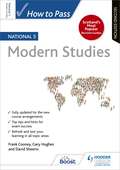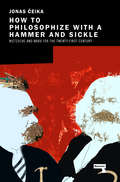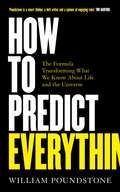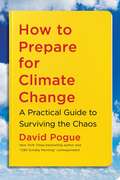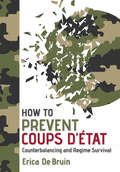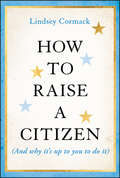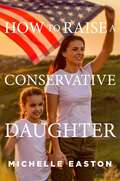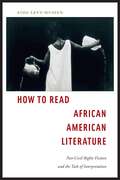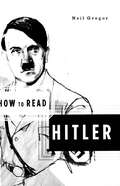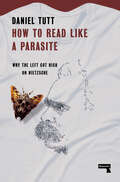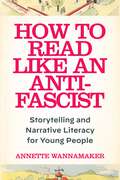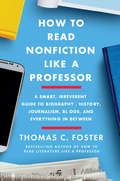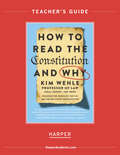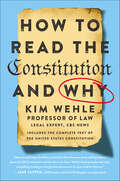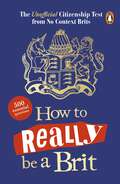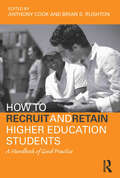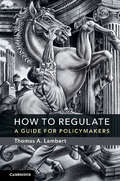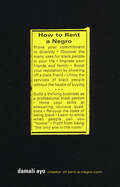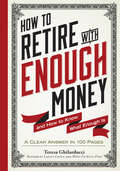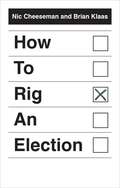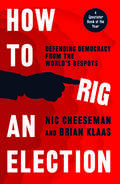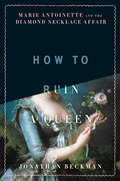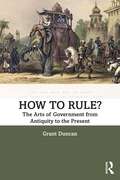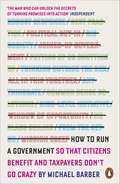- Table View
- List View
How to Pass National 5 Modern Studies, Second Edition
by Gary Hughes Frank Cooney David SheerinExam Board: SQALevel: National 5Subject: Modern StudiesFirst Teaching: September 2017First Exam: Summer 2018Fully updated to account for the removal of Unit Assessments and the changes to the National 5 exam, this book contains all the advice and support you need to revise successfully. It combines an overview of the course syllabus with advice from top experts on how to improve exam performance, so you have the best chance of success.- Refresh your knowledge with complete course notes- Prepare for the exam with top tips and hints on revision technique- Get your best grade with advice on how to gain those vital extra marks
How to Pass National 5 Modern Studies: Second Edition Ebook
by Gary Hughes Frank Cooney David SheerinExam Board: SQALevel: National 5Subject: Modern StudiesFirst Teaching: August 2017First Exam: May 2018Fully updated to account for the removal of Unit Assessments and the changes to the National 5 exam, this book contains all the advice and support you need to revise successfully. It combines an overview of the course syllabus with advice from top experts on how to improve exam performance, so you have the best chance of success.- Refresh your knowledge with complete course notes- Prepare for the exam with top tips and hints on revision technique- Get your best grade with advice on how to gain those vital extra marks
How to Philosophize with a Hammer and Sickle: Nietzsche and Marx for the 21st-Century Left
by Jonas CeikaFrom the creator of the Cuck Philosophy YouTube channel comes this timely and explosive re-evaluation of Marx and Nietzsche for the 21st-century left.Modernity has been defined by humanity's capacity for self-destruction.Over the last century, the means which threaten not only life's joy but its very existence have only multiplied. At the same time, as a new wave of nationalism and right-wing politics spreads across the world, fewer and fewer people are being convinced that socialism could improve their everyday lives, let alone save us from our own destruction.In this timely and explosive book, philosopher and YouTuber Jonas Čeika (aka Cuck Philosophy) re-invigorates socialism for the twenty-first century. Leaving behind its past associations with bureaucracy and state tyranny, and it's lifeless and drab theoretical accounts, Čeika instead uses the works of Marx and Nietzsche to reconnect socialism with its human element, presenting it as something not only affecting, but created by living, breathing, suffering human individuals.At a time when ecological collapse is hurtling towards us, and capitalism offers no solution except more growth and exploitation, How to Philosophise with a Hammer and Sickle shows us the way forward to a socialism grounded in human experience and accessible to all.
How to Predict Everything: The Formula Transforming What We Know About Life and the Universe
by William PoundstoneHow do you predict something that has never happened before? There&’s a useful calculation being employed by Wall Street, Silicon Valley and maths professors all over the world, and it predicts that the human species will become extinct in 760 years. Unfortunately, there is disagreement over how to apply the formula, and some argue that we might only have twenty years left. Originally devised by British clergyman Thomas Bayes, the theorem languished in obscurity for two hundred years before being resurrected as the lynchpin of the digital economy. With brief detours into archaeology, philology, and overdue library books, William Poundstone explains how we can use it to predict pretty much anything. What is the chance that there are multiple universes? How long will Hamilton run? Will the US stock market continue to perform as well this century as it has for the last hundred years? And are we really all doomed?
How to Prepare for Climate Change: A Practical Guide to Surviving the Chaos
by David PogueA practical and comprehensive guide to surviving the greatest disaster of our time, from New York Times bestselling self-help author and beloved CBS Sunday Morning science and technology correspondent David Pogue. You might not realize it, but we&’re already living through the beginnings of climate chaos. In Arizona, laborers now start their day at 3 a.m. because it&’s too hot to work past noon. Chinese investors are snapping up real estate in Canada. Millennials have evacuation plans. Moguls are building bunkers. Retirees in Miami are moving inland. In How to Prepare for Climate Change, bestselling self-help author David Pogue offers sensible, deeply researched advice for how the rest of us should start to ready ourselves for the years ahead. Pogue walks readers through what to grow, what to eat, how to build, how to insure, where to invest, how to prepare your children and pets, and even where to consider relocating when the time comes. (Two areas of the country, in particular, have the requisite cool temperatures, good hospitals, reliable access to water, and resilient infrastructure to serve as climate havens in the years ahead.) He also provides wise tips for managing your anxiety, as well as action plans for riding out every climate catastrophe, from superstorms and wildfires to ticks and epidemics. Timely and enlightening, How to Prepare for Climate Change is an indispensable guide for anyone who read The Uninhabitable Earth or The Sixth Extinction and wants to know how to make smart choices for the upheaval ahead.
How to Prevent Coups d'État: Counterbalancing and Regime Survival
by Erica de De BruinIn this lively and provocative book, Erica De Bruin looks at the threats that rulers face from their own armed forces. Can they make their regimes impervious to coups?How to Prevent Coups d'État shows that how leaders organize their coercive institutions has a profound effect on the survival of their regimes. When rulers use presidential guards, militarized police, and militia to counterbalance the regular military, efforts to oust them from power via coups d'état are less likely to succeed. Even as counterbalancing helps to prevent successful interventions, however, the resentment that it generates within the regular military can provoke new coup attempts. And because counterbalancing changes how soldiers and police perceive the costs and benefits of a successful overthrow, it can create incentives for protracted fighting that result in the escalation of a coup into full-blown civil war.Drawing on an original dataset of state security forces in 110 countries over a span of fifty years, as well as case studies of coup attempts in Asia, Africa, Latin America, and the Middle East, De Bruin sheds light on how counterbalancing affects regime survival. Understanding the dynamics of counterbalancing, she shows, can help analysts predict when coups will occur, whether they will succeed, and how violent they are likely to be. The arguments and evidence in this book suggest that while counterbalancing may prevent successful coups, it is a risky strategy to pursue—and one that may weaken regimes in the long term.
How to Raise a Citizen (And Why It's Up to You to Do It)
by Lindsey CormackAn essential guide to nurturing the next generation of responsible, informed citizens Lindsey Cormack's book, How to Raise a Citizen (And Why It's Up to You to Do It), speaks directly to an America in which civic knowledge is alarmingly sparse and many people dread politics. It's a tool for parents, educators, and anyone eager to fill this gap. In the book, Cormack offers an engaging and practical approach to discussing political issues and the inner workings of the U.S. government with children. She explains why our schools can no longer be the sites of civic education that they used to be and provides parents with strategies and necessary know-how to be able to impart these lessons to their children. From the intricacies of the voting process to the foundational principles of democracy and the significance of key government documents like the Constitution, the author demystifies complex topics with clarity and insight. You'll also find: Data about the current state of the American citizenry, our educational approaches to civics, and the risks of civic disengagement A framework for starting important political discussions at home Comprehensive explanations of American federalism and how different branches of government are responsible for different functions Strategies for navigating federal, state, and local elections How to Raise a Citizen is a roadmap to a future where political dialogue and civic engagement are not just encouraged but celebrated in our homes. With actionable advice and easy-to-understand explanations, it empowers readers to instill a sense of civic responsibility and curiosity in the young minds they influence. Perfect for parents, caregivers, educators, and anyone committed to cultivating an informed and active citizenry, this book is an indispensable resource for guiding children to understand, appreciate, and participate in the democratic process. Equip yourself with the knowledge and strategies to raise engaged citizens in today's politically charged world by adding How to Raise a Citizen to your library.
How to Raise a Conservative Daughter
by Michelle EastonRaising a daughter is hard. Raising a conservative daughter can feel downright impossible. As someone who has spent over a quarter-century preparing thousands of conservative girls and women for effective conservative leadership, Michelle Easton knows the daunting challenges parents face. Toxic social media, radical feminist indoctrination in schools, corrosive messages from Hollywood and the entertainment world—the dizzying array of cultural forces aligned against families are real and immediate. But so are the remedies. President Ronald Reagan once said, "Freedom is never more than one generation away from extinction. We didn't pass it to our children in the bloodstream. It must be fought for, protected, and handed on for them to do the same." The clear principles and practical tools this book provides will help you and your family raise smart, fun, conservative daughters—young women whose strength of character will keep the flame of liberty alight for generations to come.
How to Read African American Literature: Post-Civil Rights Fiction and the Task of Interpretation
by Aida Levy-HussenHow to Read African American Literature offers a series of provocations to unsettle the predominant assumptions readers make when encountering post-Civil Rights black fiction. Foregrounding the large body of literature and criticism that grapples with legacies of the slave past, Aida Levy-Hussen’s argument develops on two levels: as a textual analysis of black historical fiction, and as a critical examination of the reading practices that characterize the scholarship of our time. Drawing on psychoanalysis, memory studies, and feminist and queer theory, Levy-Hussen examines how works by Toni Morrison, David Bradley, Octavia Butler, Charles Johnson, and others represent and mediate social injury and collective grief. In the criticism that surrounds these novels, she identifies two major interpretive approaches: “therapeutic reading” (premised on the assurance that literary confrontations with historical trauma will enable psychic healing in the present), and “prohibitive reading” (anchored in the belief that fictions of returning to the past are dangerous and to be avoided). Levy-Hussen argues that these norms have become overly restrictive, standing in the way of a more supple method of interpretation that recognizes and attends to the indirect, unexpected, inconsistent, and opaque workings of historical fantasy and desire. Moving beyond the question of whether literature must heal or abandon historical wounds, Levy-Hussen proposes new ways to read African American literature now.
How to Read Hitler
by Neil GregorIntent upon letting the reader discover the central concepts of important thinkers, the How to Read series provides a context and an explanation that will facilitate and enrich your understanding of texts vital to our world today. Approaching the writing of major intellectuals, artists, and philosophers need no longer be daunting. How to Read is a new sort of introduction--a personal master class in reading--that brings you face to face with the work of some of the most influential and challenging writers in history. In lucid, accessible language, these books explain essential topics such as the implicit and explicit genocidal message within Hitler's writing.
How to Read Like a Parasite: Why the Left Got High on Nietzsche
by Daniel TuttA how-to guide for the left on how to overcome Nietzsche's divisive and damaging influence."Beautifully written and bursting with spirit, How to Read Like a Parasite is destined to be vital reading." - Matthew McManus, author of Nietzsche and the Politics of ReactionHow to Read Like a Parasite overturns the whitewashed and defanged version of Nietzsche that has been made popular by generations of translators and academic philosophers who have presented his work as apolitical and without a core reactionary agenda.The central argument of the book is that Nietzsche&’s philosophy does have a center, and that the left learns a great deal from Nietzsche when we read him as driven by a highly sophisticated reactionary political vision that informs all his major concepts and ideas.The most important Nietzschean concepts — from perspectivism, ressentiment, eternal return to the pathos of distance — are analyzed in the historical context in which Nietzsche lived and wrote, and several case-studies of prominent left-Nietzscheans from Jack London, Gilles Deleuze, Wendy Brown to Huey Newton are discussed.How to Read Like a Parasite makes a persuasive case for how we can overcome Nietzsche&’s damaging influence on the left, showing us how to read and understand his work without becoming victims of it.
How to Read Like an Anti-Fascist: Storytelling and Narrative Literacy for Young People
by Annette WannamakerOn the urgent need to promote critical reading skills amidst rising authoritarianismChildren’s author Philip Pullman famously said that “There are some themes, some subjects, too large for adult fiction; they can only be dealt with adequately in a children’s book.” While the recent rise of fascist ideology in the United States might seem a subject too large and adult to be dealt with in literature for children or teens, Annette Wannamaker proposes in How to Read Like an Anti-Fascist that there are books aimed at future generations which critique and counter fascist propaganda and mythmaking.Works of literature can reflect fascist ideology and promote it as well, but Wannamaker proposes that some books also offer tools for understanding it. Books written for beginners can introduce readers to complex concepts, break big ideas into manageable parts, and teach readers how to read the world outside of the book. Antifascist books are ones that analyze fascistic rhetoric and storytelling, educate about America’s long history of authoritarianism, and highlight various facets of fascism such as scapegoating others and reasserting patriarchal power.From “The Emperor’s New Clothes” and the tales of Superman to Mildred Taylor’s Roll of Thunder, Hear My Cry, the 1619 Project and contemporary works such as All Boys Aren’t Blue and Donald Builds the Wall, Wannamaker shows how the ethos of authoritarianism is characterized by a strict hierarchy that places children at its very bottom. In doing so, she argues convincingly that books written for young people can provide a particular view from the bottom, a perspective well-suited to interrogating systems of power.
How to Read Nonfiction Like a Professor: A Smart, Irreverent Guide to Biography, History, Journalism, Blogs, and Everything in Between
by Thomas C FosterThe New York Times bestselling author of How to Read Literature Like a Professor uses the same skills to teach how to access accurate information in a rapidly changing 24/7 news cycle and become better readers, thinkers, and consumers of media.We live in an information age, but it is increasingly difficult to know which information to trust. Fake news is rampant in mass media, stoked by foreign powers wishing to disrupt a democratic society. We need to be more perceptive, more critical, and more judicious readers. The future of our republic may depend on it. How to Read Nonfiction Like a Professor is more careful, more attentive, more aware reading. On bookstore shelves, one book looks as authoritative as the next. Online, posts and memes don’t announce their relative veracity. It is up to readers to establish how accurate, how thorough, how fair material may be. After laying out general principles of reading nonfiction, How to Read Nonfiction Like a Professor offers advice for specific reading strategies in various genres from histories and biographies to science and technology to social media. Throughout, the emphasis will be on understanding writers’ biases, interrogating claims, analyzing arguments, remaining wary of broad assertions and easy answers, and thinking critically about the written and spoken materials readers encounter. We can become better citizens through better reading, and the time for that is now.
How to Read the Constitution--and Why Teaching Guide (Legal Expert Series)
by Kim WehleAn insightful, urgent, and perennially relevant handbook that lays out in common sense language how the United States Constitution works, and how its protections are eroding before our eyes—essential reading for anyone who wants to understand and parse the constantly breaking news about the backbone of American government.The Constitution is the most significant document in America. But do you fully understand what this valuable document means to you? In How to Read the Constitution and Why Now, legal expert and educator Kimberly Wehle spells out in clear, simple, and common sense terms what is in the Constitution, and most importantly, what it means. In compelling terms, she describes how the Constitution’s protections are eroding—not only in express terms but by virtue of the many legal and social norms that no longer shore up its legitimacy—and why every American needs to heed to this “red flag” moment in our democracy.This invaluable—and timely—resource covers nearly every significant aspect of the Constitution, from the powers of the President and how the three branches of government are designed to hold each other accountable, to what it means to have individual rights—including free speech, the right to bear arms, the right to be free from unreasonable searches and seizures, and the right to an abortion. Finally, the book explains why it has never been more important than now for all Americans to know how our Constitution works—and why, if we don’t step in to protect it now, we could lose its protections forever.How to Read the Constitution and Why Now is essential reading for anyone who cares about maintaining an accountable government and the individual freedoms that the Constitution enshrines for everyone in America—regardless of political party.
How to Read the Constitution—and Why (Legal Expert Series)
by Kim Wehle“A must-read for this era” that lays out in common sense language how the US Constitution works, and how its protections are eroding before our eyes (Jake Tapper, CNN Anchor and Chief Washington Correspondent).The Constitution is the most significant document in America. But do you fully understand what it means to you? In How to Read the Constitution—and Why, legal expert and educator Kimberly Wehle spells out in clear, simple, and common-sense language what is in the Constitution, and most importantly, what it means. In compelling terms and including text from the United States Constitution, she describes how its protections are eroding—not only in express terms but by virtue of the many legal and social norms that no longer shore up its legitimacy—and why every American needs to heed to this “red flag” moment.This invaluable—and timely—resource includes the Constitution in its entirety and covers nearly every significant aspect of the text, from the powers of the President and how the three branches of government are designed to hold each other accountable, to what it means to have individual rights—including free speech, the right to bear arms, the right to be free from unreasonable searches and seizures, and the right to an abortion. Finally, the book explains why it has never been more important than now for all Americans to know how our Constitution works—and why, if we don’t step in to protect it, we could lose its protections forever.How to Read the Constitution—and Why is essential reading for anyone who cares about maintaining an accountable government and the individual freedoms that the Constitution enshrines for everyone in America—regardless of political party.
How to Really be a Brit: The Unofficial Citizenship Test: A fun, fact-filled quiz book to test your knowledge of British culture!
by No Context BritsThis is the perfect gift for the least traditional person in your life - or an affectionate nod to the most!'Whilst the biggest political figures and finest historians have struggled for over a century to truly define what "being British" is, No Context Brits manages to do it five times a week, easily, on Twitter' CAITLIN MORANDo you know what year the Harrier jump jet was developed?What about the name of the first king of Scotland?Surely you must know the contents of the 1969 Bill of Rights?!Don't know the answers? Sorry, according to the Home Office, you're clearly not cut out to be a British Citizen. These inane questions have been posed by the Life in the UK test, more commonly known as the British citizenship test. If only there was an alternative test that wasn't stuck revelling in past glories . . . one that was fun, irreverent and unafraid to offer a glimpse of real life in the UK.How to Really be Brit is the unofficial citizenship test from the beloved No Context Brits Twitter account. You'll find 500 questions taking in every aspect of UK life - from Wrexham to Windrush, Bake Off to Brexit, scotch eggs to the Spice Girls and more.
How to Recruit and Retain Higher Education Students: A Handbook of Good Practice
by Tony Cook Brian S. RushtonHow to Recruit and Retain Higher Education Students is an invaluable resource for academic staff, administrators and policy makers involved in student recruitment and improving student retention. It offers practical advice on how universities can influence the expectations of prospective students, allowing them to make sensible decisions about careers, courses and institutions. Many surveys of students who drop out of university show that most do so out of disappointment. Failing to understand what higher education was about quickly enough, they become confused and frustrated. Dropping out seems the best solution. This book describes a series of practices proven to encourage students to stay on, discussing the background research on student attrition. By preparing students better for their higher education experience, the practices in this book are effective not only in recruiting students but also in matching them to the right institutions and programmes. The practices described range from those reaching out in a broad way to communities of potential students, to university support for pre-entry examinations, to enhanced communication between institutions and applicants. All are described in sufficient detail to allow judgments to be made about how to use and adapt them to suit local needs. How to Recruit and Retain Higher Education Students provides a sound theoretical foundation for research into student retention and provides the necessary underpinning for those academic staff embarking on courses and assists in preparing them for their roles in both teaching and student support.
How to Regulate: A Guide for Policymakers
by Thomas A. LambertMarkets sometimes fail. But so do regulatory efforts to correct market failures. Sometimes regulations reach too far, condemning good activities as well as bad, and sometimes they don't reach far enough, allowing bad behavior to persist. In this highly instructive book, Thomas A. Lambert explains the pitfalls of both extremes while offering readers a manual of effective regulation, showing how the best regulation maximizes social welfare and minimizes social costs. Working like a physician, Lambert demonstrates how regulators should diagnose the underlying disease and identify its symptoms, potential remedies for it, and their side effects before selecting the regulation that offers the greatest net benefit. This book should be read by policymakers, students, and anyone else interested in understanding how the best regulations are crafted and why they work.
How to Rent a Negro
by Damali AyoA hilarious and satirical look at race relations that is almost too close for comfort, this pseudo-guidebook gives both renters and rentals "much-needed" advice and tips on technique. Reframing actual stories, techniques, requests, and responses gathered from the author's more than 30 years of research and experience, tips are provided in step-by-step outlines for renters to get the most for their money, and how rentals can become successful and wealthy, what they should wear, and topics of conversation to avoid. The book also serves up photo-dramatizations of some of the popular approaches covered in the book, handy tip-boxes, frequently asked questions for renters and rentals, a "How do I know if I'm being rented" quiz, a glossary of important terms, and "quickie" insta-rentals for those who need to rent on the go. Punctuated by quotes from former renters, and featuring rental diaries based on real encounters, this satire shocks and amuses, presenting a strikingly stark mirror of human relationships.
How to Retire with Enough Money: And How to Know What Enough Is
by Teresa GhilarducciHere is a single-sit read than can change the course of your retirement. Written by Dr. Teresa Ghilarducci, an economics professor, a retirement and savings specialist, and a trustee to two retiree health-care trusts worth over $54 billion, How to Retire with Enough Money cuts through the confusion, misinformation, and bad policy-making that keeps us spending or saving poorly. It begins with acknowledging what a person or household actually needs to have saved—the rule of thumb is eight to ten times your annual salary before retirement—and how much to expect from Social Security. And then it delivers the basic principles that will make the money grow, including a dozen good ideas to get current expenses under control. Why to “get rid of your guy”—those for-fee (or hidden-fee) financial planners that suck up valuable assets. Why it’s always better to pay off a loan or a mortgage. There are no gimmicks, no magical thinking—just an easy-to-follow program that works.
How to Rig an Election
by Nic Cheeseman Brian KlaasAn engrossing analysis of the pseudo-democratic methods employed by despots around the world to retain control Contrary to what is commonly believed, authoritarian leaders who agree to hold elections are generally able to remain in power longer than autocrats who refuse to allow the populace to vote. In this engaging and provocative book, Nic Cheeseman and Brian Klaas expose the limitations of national elections as a means of promoting democratization, and reveal the six essential strategies that dictators use to undermine the electoral process in order to guarantee victory for themselves. Based on their firsthand experiences as election watchers and their hundreds of interviews with presidents, prime ministers, diplomats, election officials, and conspirators, Cheeseman and Klaas document instances of election rigging from Argentina to Zimbabwe, including notable examples from Brazil, India, Nigeria, Russia, and the United States—touching on the 2016 election. This eye-opening study offers a sobering overview of corrupted professional politics, while providing fertile intellectual ground for the development of new solutions for protecting democracy from authoritarian subversion.
How to Rig an Election
by Nic Cheeseman Brian KlaasAn engrossing analysis of the pseudo-democratic methods employed by despots around the world to retain control Contrary to what is commonly believed, authoritarian leaders who agree to hold elections are generally able to remain in power longer than autocrats who refuse to allow the populace to vote. In this engaging and provocative book, Nic Cheeseman and Brian Klaas expose the limitations of national elections as a means of promoting democratization, and reveal the six essential strategies that dictators use to undermine the electoral process in order to guarantee victory for themselves. Based on their firsthand experiences as election watchers and their hundreds of interviews with presidents, prime ministers, diplomats, election officials, and conspirators, Cheeseman and Klaas document instances of election rigging from Argentina to Zimbabwe, including notable examples from Brazil, India, Nigeria, Russia, and the United States—touching on the 2016 election. This eye-opening study offers a sobering overview of corrupted professional politics, while providing fertile intellectual ground for the development of new solutions for protecting democracy from authoritarian subversion.
How to Ruin a Queen: Marie Antoinette and the Diamond Necklace Affair
by Jonathan BeckmanA tale of greed, lust, deceit, theft on an extraordinary scale, charlatanry, kidnapping, assassination and escape from prison.
How to Rule?: The Arts of Government from Antiquity to the Present
by Grant DuncanA guide through history for those perplexed about the fate of democracy and the government of diverse societies. In war and in peace, amid disruptive change and during reconstruction, a government of people and events will always be called for. But in this age of anxiety and uncertainty, people on the left and the right are losing confidence in governments, elections and politicians. Many ask whether democracy has failed, and ponder alternatives. Knowing how to govern, and how to be governed, are necessary for solving collectively our pressing social and ecological problems. This book rediscovers diverse models of government, including the successful statecraft and drastic mistakes of past rulers and their advisers. From ancient to modern times, what methods of government have arisen and succeeded, or what were their fatal flaws? What ethical and political ideas informed the rulers and the ruled? How have states dealt with unexpected calamities or with cultural and religious differences? And what kept things (more or less) running smoothly? Amid rapid change and political dissent, it’s timely to re-examine the ideas and practices that governed large populations and guided their rulers. In an age of political distrust, disruptive populism and global crises, we need to rearm ourselves with knowledge of history and diverse political ideas to better address contemporary problems. This book will appeal to students in political theory, political history, or history of government and public policy.
How to Run A Government: So that Citizens Benefit and Taxpayers Don't Go Crazy
by Michael BarberBillions of citizens around the world are frustrated with their governments. Why is this? And what can we do about it? In this groundbreaking book Michael Barber draws on his wealth of international experience advising political leaders, to show how those in power can make good on their promises. 'Refreshingly ruthless ... has an uplifting brio to it' Economist'Michael Barber is a source of inspiration and wisdom' Andrew Adonis, New Statesman'Excellent ... there is a lot of common sense and practical wisdom ... a breath of fresh air' David Willetts,Standpoint'Barber is the global overlord of public policy ... a record around the world of actually achieving change' Philip Collins, Prospect
